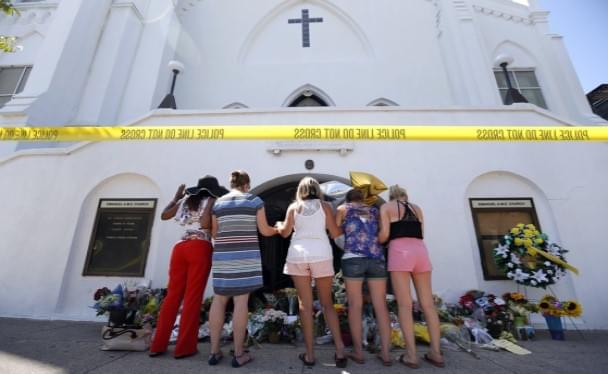COLUMBIA, S.C. — Defying state law, officials in the historic city of Charleston, South Carolina, announced Wednesday that they plan to remove a statue of slavery advocate John C. Calhoun from a downtown square.
Mayor John Tecklenburg announced he will send a resolution to the City Council to remove the statue at a news conference on the fifth anniversary of the slaying of eight black church members and their pastor in Dylann Roof’s racist attack at a downtown Charleston church. The move comes as monuments to Confederates and other historical figures who repressed or oppressed other people have been removed across the country.
After the Roof massacre, officials came together to remove the Confederate flag from its site on the Statehouse lawn. On Tuesday, the current pastor of Mother Emanuel stood with civil rights activists and politicians who called for the removal of the Calhoun statue, a 100-foot-tall (30-meter-tall) monument that presides over Francis Marion Square in the heart of the city.
Calhoun’s support of slavery never wavered. And in an 1836 speech before the U.S. Senate, he said slaves in the South were better off than free blacks in the North.
The Rev. Nelson Rivers said Calhoun “represents Dylann Roof to us” and said Charleston leaders should defy the unjust Heritage Act — which does not include penalties for breaking it — and remove the statue.
“The time has come to not just acknowledge your racist evil wicked past. The time has come to take down the monuments that honor the evil that was done in the name of Charleston, in the name of South Carolina,” Rivers said Tuesday at the foot of Calhoun’s statue.
The 2015 Confederate flag debate was the last time the General Assembly invoked a 2000 law called the Heritage Act, which protects all historical monuments and names of buildings. A two-thirds vote from the state General Assembly is required to make any changes.
That’s a tough task in a state where conservative Republicans dominate the House and Senate, made harder after Republican House Speaker Jay Lucas said, days after the Confederate flag came down in 2015, that he would never consider another change like it while he led the House.
Lucas has not only kept his word, he’s failed to respond to repeated interview requests and questions whether his stance has since changed.
Pressure is mounting, however. Clemson University trustees voted Friday to ask the General Assembly to let it change the name of Tillman Hall, a main building on campus named for “Pitchfork” Ben Tillman.
Tillman gained prominence supporting a white mob that killed four black men in 1876 after they surrendered to them. He later became South Carolina’s governor and a U.S. senator, committed to destroying any rights blacks obtained after the Civil War.
“We of the South have never recognized the right of the negro to govern white men, and we never will. We have never believed him to be equal to the white man, and we will not submit to his gratifying his lust on our wives and daughters without lynching him,” Tillman said in a 1900 congressional speech.
The president of the University of South Carolina wants lawmakers to let the school remove the name of J. Marion Sims from a women’s dorm. Sims is honored as the father of modern gynecology, but conducted experimental treatment on slaves without anesthesia.
Sims and Tillman also have statues on the Statehouse lawn. Some African American lawmakers want plaques added, explaining their racist views. Others, like Rep. Justin Bamberg, want them gone.
“I don’t like seeing ‘Pitchfork’ Ben Tillman every dang day I go to the Statehouse,” the Democrat said. “He boldly and proudly supported lynching my people.”
Copyright 2020 The Associated Press. All Rights Reserved. This material may not be published, broadcast, rewritten, or redistributed. Photo: AP





















